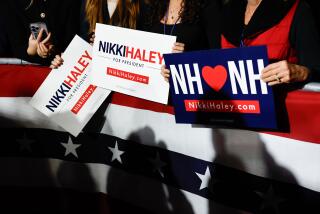How Bush’s 7-Year Courtship of N.H. Paid Off
- Share via
NASHUA, N.H. — Last Friday, as a thundering blizzard dumped a foot of snow on the city, New Hampshire Gov. John H. Sununu held forth in a hotel restaurant, sipping onion soup and laying out with exacting confidence the reasons George Bush would prevail in the primary to come.
Tracking polls that day gave Bush’s rival, Kansas Sen. Bob Dole, supremacy among the state’s voters after a week of confident campaigning by Dole and a thrashing, jerky strategy by the vice president. Sununu nonetheless maintained that the race was Bush’s to lose.
“We spent a year putting ourselves in a position where we feel that the last few days of the campaign we will pick up,” Sununu said. “We feel that whatever the polling data is five minutes before the polls open, our organization gives us a margin of a couple of points.”
That and other Sununu predictions proved prescient. When Bush arrived in New Hampshire Feb. 8, battered by a third-place finish in the Iowa caucuses, Sununu predicted a margin of victory of 8 points, a Bush aide said. He was only a point off.
Four Crucial Days
On Wednesday, buoyed by a convincing victory in New Hampshire, Bush aides were putting forth all manner of reasons for the unexpectedly strong finish, but high among them were his broad organization in the Granite State and his decision, in the final, crucial four days, to bore in on Dole.
The Bush organization had been in place in New Hampshire for seven years, cultivated since the vice president’s disappointing loss to Ronald Reagan in the 1980 presidential primary. Its chief symbols were Sununu and Rep. Judd Gregg, two politicians who are not known as the best of friends but who maintained a unified public front throughout the Bush campaign.
Sununu and other Bush operatives in New Hampshire insisted on what the governor liked to call a “see me, touch me, feel me” campaign. In October, the day before his formal announcement of candidacy, Bush greeted more than 3,000 people invited to Gregg’s rural New Hampshire home.
All along, the campaign sent out newsletters to update supporters on the candidate’s status and involved nearly 370 precinct co-chairmen in the state’s 299 voting precincts in the campaign’s overall planning effort.
Even on the day of the snowstorm, when state police asked all non-emergency vehicles to stay off the streets, 200 Bush supporters were showering local homes with literature. And from 3:30 to 6:30 a.m. the morning of the primary, hundreds of young Bush workers put up 10,000 blue-and-white Bush signs throughout the state.
Still, the path to victory was tumultuous. Mudslinging between Bush and Dole in Iowa cost the Bush campaign important time needed to get its message out, Sununu said. Bush’s first attempt to clarify his image in the state--swiping a Dole line and telling voters he was one of them--backfired and cost the campaign two more days.
Unveils New Speech
But on Thursday, after much vacillation inside the campaign, Bush unveiled a new speech and began taking Dole on by name, something he had refused to do in Iowa. “His message was focused and well-received by voters,” said Andrew Card, Bush’s senior adviser in New Hampshire.
Bush also scaled down his surroundings, turning from country clubs to truck stops and loosening up his restrictive security entourage so he could come in contact with voters--and, as importantly, be seen by television viewers as a comfortable, unintimidating presence.
By Friday night, phone banks manned by Bush volunteers began showing a turnaround in the campaign’s fortunes.
More to Read
Get the L.A. Times Politics newsletter
Deeply reported insights into legislation, politics and policy from Sacramento, Washington and beyond. In your inbox three times per week.
You may occasionally receive promotional content from the Los Angeles Times.











